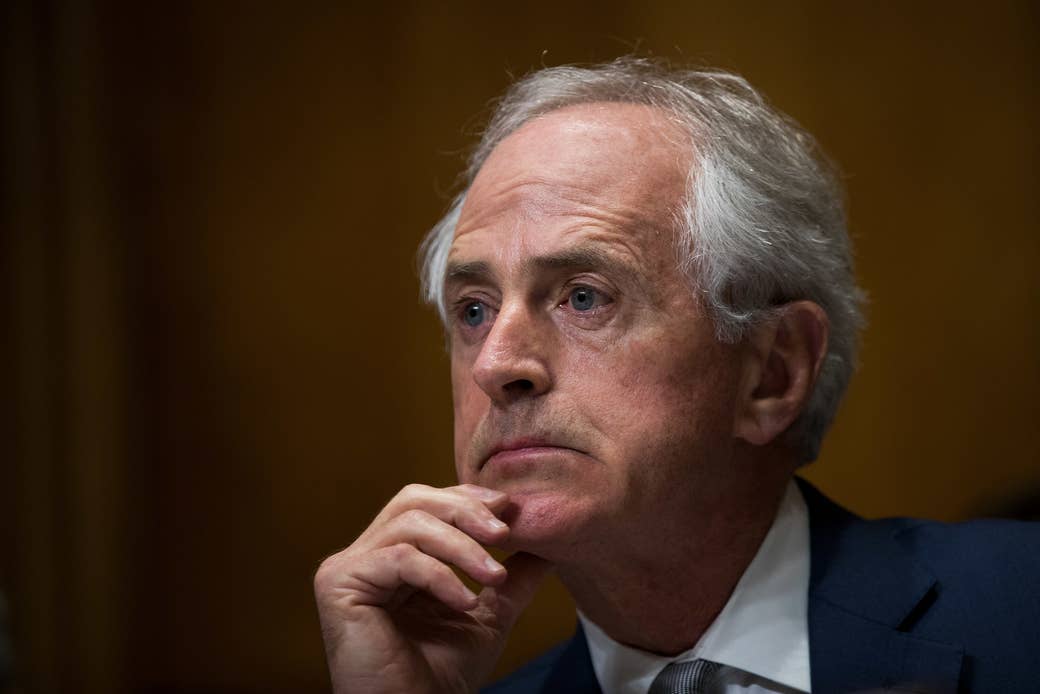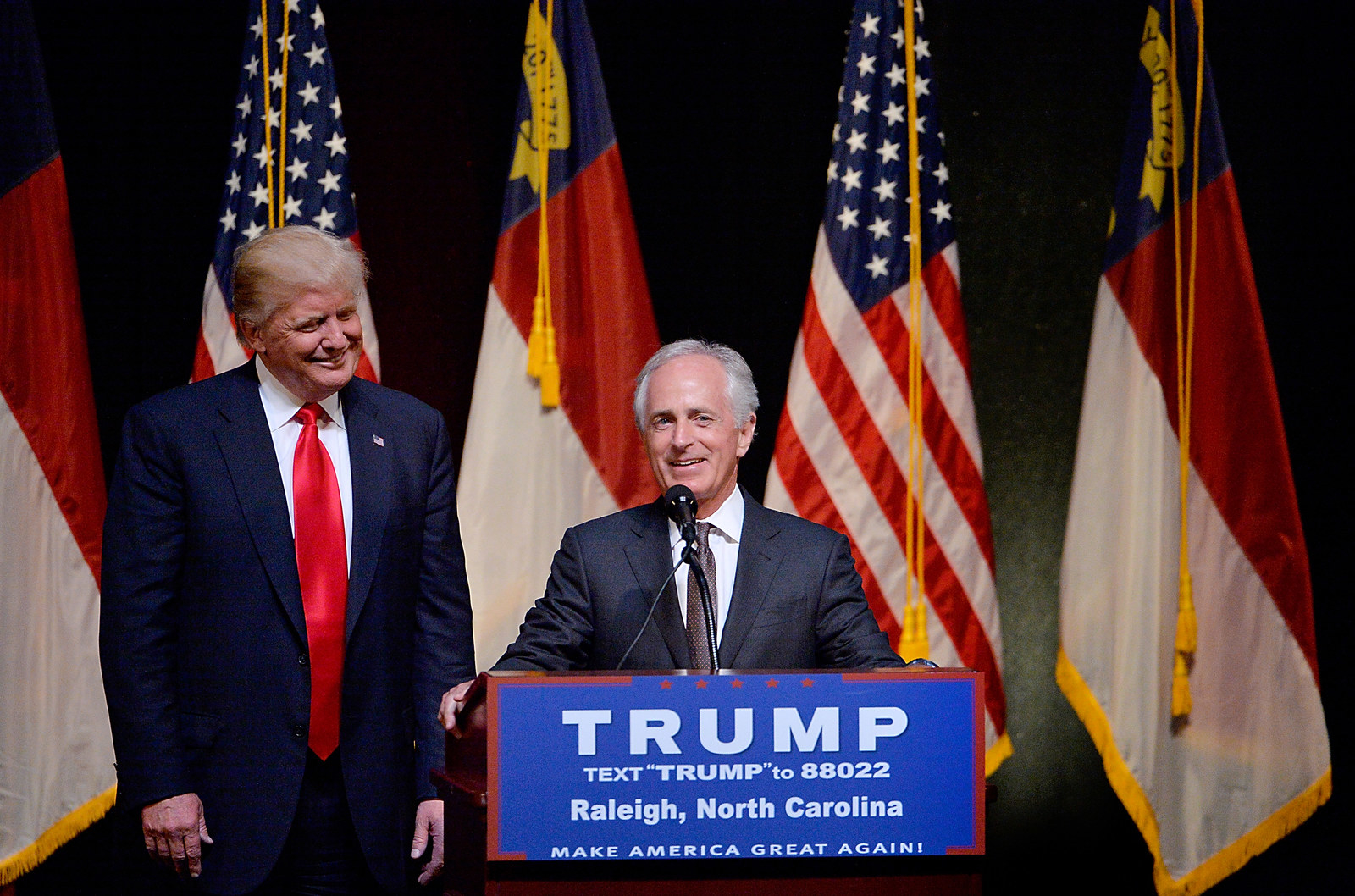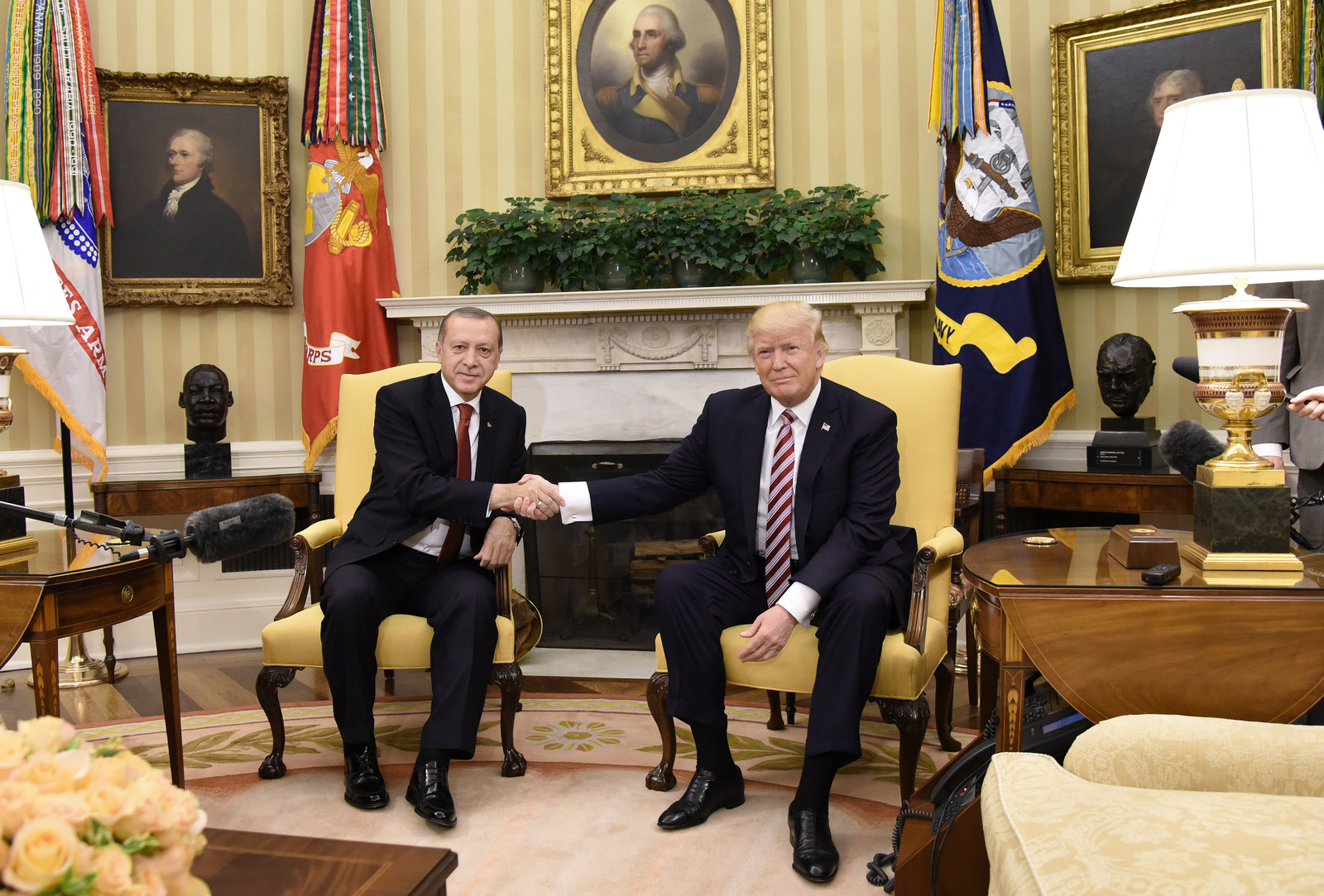
After another damaging story — this one revealing that President Trump had divulged classified information to Russians in the Oval Office — was published last week, most Republicans in the Senate were still carefully choosing their words.
But Tennessee Republican Sen. Bob Corker didn’t hold back: “Obviously, they’re in a downward spiral right now and have got to figure out a way to come to grips with all that’s happening,” he told reporters.
The two-word phrase he used in his Southern drawl — “downward spiral” — was soon splashed on front pages of newspapers across the country and repeated on cable news. Corker had — perhaps inadvertently — become the face of the small group of Republicans willing to rebuke the president.
But to hear Corker tell it, when he speaks out, his comments don't come as a surprise to the president or White House staff.
Days earlier, Corker had spoken to Trump over the phone about the firing of FBI director James Comey — an incident the Tennessee Republican publicly said would “raise questions.” And in a previous late-April private dinner, Corker said he made it clear to Trump that the turmoil in the White House was making it harder for Republicans to move forward with anything in Congress.
“I actually shared many of the same concerns, OK? Respectfully, of course,” he said in a wide-ranging interview with BuzzFeed News Wednesday afternoon.
“We've got close relations and talked frankly with people (at the White House) often,” he continued, repeating two words for emphasis: “Frankly. Often.”
“If you look at what I said, the entire statement — not just the 'downward spiral' portion — all of it, I don't know, would 90% of the Senate agree with it? I think so.”
But his Republican colleagues weren’t as blunt, or as public as Corker was.
“Yeah, and Micah maybe didn't want me to publicly say it,” he said looking in direction of his press secretary with a laugh. “But it's just kind of who I am. I wasn't saying something publicly that I hadn't already said privately. And I didn't say it actually to be destructive. I said it to be constructive. And I think there were probably people over at the White House who were cheering.”
Corker immediately rephrased: “I don't think that. I know that.”
"I didn't say it actually to be destructive. I said it to be constructive. And I think there were probably people over at the White House who were cheering.”
Corker has been walking a tightrope for months: He was an early Trump supporter and on the short list to serve as secretary of state, but as chairman of the Senate Foreign Relations Committee, he has had to deal with frequent concerned calls from foreign leaders and occasionally had to distance himself from the president.
During the last two weeks’ seemingly endless stream of news reports and leaks from the administration that could have major foreign policy implications, Corker has found himself repeatedly dragged to the center of the chaos.
Part of his role, he admits, has become comforting foreign leaders. “Yes, no doubt, things end up getting said, and yes, I mean I do find myself providing nuance to other foreign leaders. No question. That's a role that I have.”
Despite his sporadic criticism of the administration, another key part of the job has become regularly giving feedback to Trump and top White House staff on foreign policy and other matters. Although some top Republicans have complained about lack of communication with the White House, Corker, who called himself an “honest adviser,” has had a different experience.
“We do have an administration that is far more embracing of input than any other I've served with,” said the two-term senator.

Before departing for the president’s first foreign trip, Trump’s son-in-law Jared Kushner, National Security Adviser H.R. McMaster and Deputy National Security Adviser Dina Powell met with Corker to get his input on policy and strategy, especially in preparation for the president’s meetings with world leaders.
“It appears to me that it couldn’t have been much more successful than it has been,” Corker said of the trip so far. “It seems that everything has gone off as planned. The message was as was shared with us in advance. Again, by all counts, a very, very successful trip.”
But while the president was traveling, a new story based on a leaked transcript of Trump’s phone call with Philippines President Rodrigo Duterte was already causing outrage among Democrats and some Republicans on Capitol Hill. According to the transcript, Trump praised Duterte’s handling of his anti-drug campaign, which has killed thousands of drug dealers and users.
Corker this time wasn’t critical. He cautioned against reading too much into the conversation.
“I don't make anything of it as it relates to the administration's policy. I think the president's tendency is when he's talking to people to first establish a warmer relationship, and so you know what I find on many occasions is that some things are said in a way of sort of reaching out, but it doesn't necessarily mean that a policy comes out of that support.”
He used Trump congratulating Turkish President Recep Tayyip Erdoğan, who has increasingly taken an authoritarian approach to governing, as an example of his theory.
“You look, for instance, the call to the Turkish president congratulating him — on an unfortunate win from my perspective. But on the other hand, we moved quickly to support the Kurds. Thankfully, which was counter to what the Turkish president wanted to see happen.”
But asked about the optics, beyond policy outcomes, of Trump’s recent meeting with Erdoğan in the Oval Office, and his silence as video emerged showing Erdoğan’s security attacking Kurdish protesters in Washington, Corker paused before saying, “I hear ya,” and then repeating his theory.

“There are some things that certainly, you know, I might not have said or might have omitted, but think that much of that can be attributed to he's new, he doesn't have relationships with people and he's trying to establish warmth and a relationship to build upon.”
Looking beyond the seemingly daily distractions from the White House, Corker stressed that the United States hasn’t had a consistent foreign policy in decades, with every president campaigning on an approach to the world that’s different from his predecessor.
Although he admits he didn’t understand it during the campaign, Corker said he thinks the president’s “America First” slogan could help in creating one that can even outlast Trump.
“The American people feel totally disconnected with our foreign policy, and we've got to do a much better job. Our foreign policy matters greatly to our nation, and we just haven't done a good job in explaining that to people back home, why some of the things we do are important to them. We've got an opportunity with the slogan that’s out there.”
But asked about the slogan being used to justify drastic proposed cuts to foreign aid and diplomacy, Corker pointed out that Trump's decision to opt for those reductions instead of entitlement reform was the root of the problem.
Once again, Corker took a shot at the administration and didn’t hold back.
“The reason the cuts are the way they are is really because the administration hasn't been willing to deal with the real drivers of spending... I look at it as these were easy places to go because the administration wasn't willing to deal with where the real money is.”

